★★★½
“From Russia without love.”
So, I saw “Red Sparrow”. But I was hesitant. So hesitant, I actually pressed the button to get off the bus when I was still not so far away from my flat. But the door didn’t open; I interpreted that as force majeure and stayed until I reached the cinema.
First of all, this movie is not what it seems to be – or is marketed as. Which you could already sense; I mean, if you see a trailer for a 140 minute-movie and there is not the slightest indication of action, it could perhaps be guessed that it’s not really an action movie. And indeed, it’s not. If someone goes into the movie expecting a movie like Atomic Blonde, Unlocked, Salt or Haywire, he/she will likely be disappointed. The action early on is only with Joel Edgerton, not with Lawrence. And despite beating up a treacherous couple responsible for the end of her ballerina career, and an extended torture scene at the end that ends with a stabbing, Dominika is usually not involved.
This movie reminded me most of all of the American remake of The Girl with the Dragon Tattoo: long and drawn-out, but without the suspense. You have to have what we call in Germany “good seating-flesh” – you’re sitting a long time in the cinema! When the film ended, an old woman behind me who was there with her son and his wife whispered, “Schwere Kost, nicht wahr?”. That translates as “A heavy meal, wasn’t it?”, meaning it’s not easily digestible. I was also reminded of John LeCarré movies, where everything is all talk and no action at all. So it’s not an action-adventure, or a “girls with guns” movie. But I think that fans of Jennifer Lawrence (mainly in the USA, not really in Germany) and feminists won’t likely embrace or love this movie. It’s not really an “enjoyable” movie, that can serve a quasi-feminist agenda in the way Wonder Woman did.
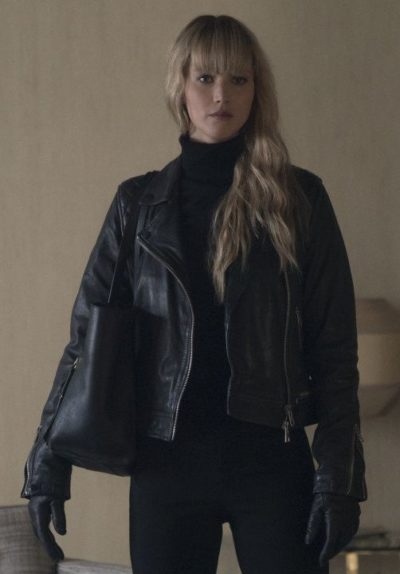 No, the main theme of the movie is the constantly shifting sands underfoot, which could easily open up at any moment and swallow the main protagonist. Some characters die during the course of the story, and it’s not necessarily the guilty ones who catch a bullet. But it’s a problem that there are hardly any sympathetic characters in the movie. Even Dominika is a big question mark, as the Russian secret service tactics force her to play a game of deception and manipulation, exactly as she was trained for. It leaves you, even at the end, guessing on which side she is/was/may have been on, in shades of Atomic Blonde. Things constantly change…
No, the main theme of the movie is the constantly shifting sands underfoot, which could easily open up at any moment and swallow the main protagonist. Some characters die during the course of the story, and it’s not necessarily the guilty ones who catch a bullet. But it’s a problem that there are hardly any sympathetic characters in the movie. Even Dominika is a big question mark, as the Russian secret service tactics force her to play a game of deception and manipulation, exactly as she was trained for. It leaves you, even at the end, guessing on which side she is/was/may have been on, in shades of Atomic Blonde. Things constantly change…
It also reminded me of Child 44 with Tom Hardy, Gary Oldman, Noomi Rapace and – hey! – Joel Edgerton. This was a serial killer story set in Stalin-era Soviet Union, in which you could constantly lose your head or fall victim to intrigue. The feeling of constant threat and danger was stronger there. But I note, “Soviet Union,” because confusingly, this movie seems to play in contemporary Russia. Which is…. quite strange: the “red sparrow” program did exist in the 1960s but may not even have survived that decade, never mind existing today. The movie adapts the first book in a trilogy by a former American agent so he presumably knows what he wrote about; it all appears very realistic.
But with modern Russia as the background? I find that a bit hard to believe. German reviewers tended to complain about old clichés, thicker than in classic James Bond movies. They may be partly right. When I saw Charlotte Rampling standing and explaining to Lawrence what her duty is, in front of the “school for whores”, I was very much reminded of Lotte Lenya as Rosa Klebb, setting Daniela Bianchini up to attract James Bond. And the Secret Service of Russia appears to come right out of the 50s/60s, not today. Much has also been made, mainly by American reviewers, about the sex/nude/violent scenes. While they are all part of the story, if you are looking at the whole of the movie – once again, 140 long minutes – it doesn’t feel as spectacular or scandalous as the articles made it. Strangely, even Lawrence seemed to play up the sex angle in interviews (also causing a minor outcry by puritans when she appeared at a premiere of the movie, showing some cleavage…). Yes, you see her nude in the movie but I can’t personally say a 3-second shot of one breast and 10 seconds on her butt would be worth the admission!
I mean. Jennifer, you know there exists something called internet pornography? You really think we men are so hormone-driven that a glimpse of your almost-naked body for a few seconds would make us buy a (not really that cheap) ticket for a 140 minute movie? Reeaalllllyyy? ;-) But then this may also be testament to a certain kind of desperation on the part of the studio: how else to sell this clunky piece of espionage fiction. What do you do when you have no big action scenes or robots from space?
There is a nasty but quick rape scene, but we saw worse in The Girl With the Dragon Tattoo movies. It has to be said, this scene seemed stolen almost 1:1 from Stoker, with Mia Wasikowska and Nicole Kidman. There are some ugly torture scenes but they are similarly brief, except for the last one. And as I hardly sympathized or identified with any of the characters, they also failed to make an emotional impact on me. I really have to say: After having explored the “Giallo” genre, I can say these kinds of movies – done almost 50 years ago – were much more terrifying when it came to violence, and more daring with regard to nudity or sex. So, I have a problem when some articles seem to celebrate Jennifer Lawrence’ dedication for “revealing so much” and “daring”. Maybe it’s shocking for today’s (female?) American cinema-goers, I don’t know. By my standards and in my opinion, it’s quite tame in all aspects.
 I do give credit to Lawrence, who never saw an acting school from the inside, and has matured – yes, even by my standards! – into a “real actress”. I personally find it very positive that a studio is willing to make a movie almost entirely focused on its story with a nice budget ($69 million) instead of the next action-SFX-extravaganza. But I have seen better. That said, for those willing to invest the time and money, the movie may actually provide something. The actors are all good – I have not mentioned Mary Louise Parker in surprise cameo in the middle of the movie), the production design is impressive (even if Film-Russia seems to have a preference for 1970’s interior design) and the James Newton Howard (Salt, btw.) score is solid as always, even though it mainly plays in the background.
I do give credit to Lawrence, who never saw an acting school from the inside, and has matured – yes, even by my standards! – into a “real actress”. I personally find it very positive that a studio is willing to make a movie almost entirely focused on its story with a nice budget ($69 million) instead of the next action-SFX-extravaganza. But I have seen better. That said, for those willing to invest the time and money, the movie may actually provide something. The actors are all good – I have not mentioned Mary Louise Parker in surprise cameo in the middle of the movie), the production design is impressive (even if Film-Russia seems to have a preference for 1970’s interior design) and the James Newton Howard (Salt, btw.) score is solid as always, even though it mainly plays in the background.
The studio’s idea behind the green light for the movie may have been to create another successful franchise. The formula? Actress Jennifer Lawrence + director Francis Lawrence + adapt a successful bestseller. It worked with the Hunger Games movies – Lawrence directed the last three – but I fear won’t be the case here. While I can imagine that the book may have been a great read for those who love a good spy story, that alone does not necessarily recommend it to become a blockbuster movie, despite some admirable achievements by the team in front and behind the camera.
For fans of Tinker, Tailor, Soldier, Spy or The Russia House, it may be worth the admission. Everyone else, can wait for the movie to become available as a rental or on TV. Honestly, I would prefer a sequel to Atomic Blonde or The Man From U.N.C.L.E. [The latter should have been so much more successful, but didn’t get the same advertising push as this new J-Law vehicle] While it’s no bad movie at all, people may be lured in based on wrong assumptions, such as thinking this is some kind of Black Widow origin story. They’ll leave disappointed, and I predict another flop in Lawrence’s career.
Dir: Francis Lawrence
Star: Jennifer Lawrence, Joel Edgerton, Matthias Schoenaerts, Jeremy Irons
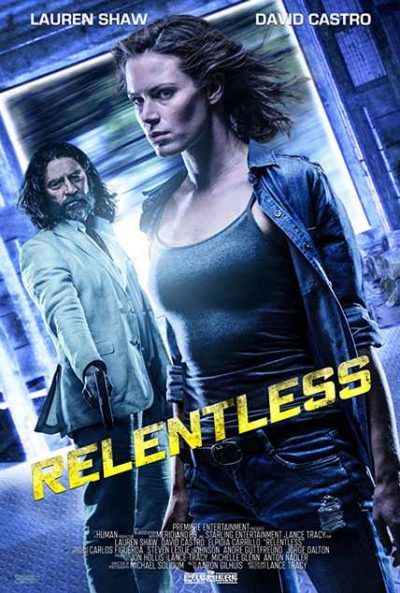 From just about all I’ve read, the director seems entirely earnest in his desire to make a serious film about a serious problem, human trafficking in Central America. That the end result falls almost entirely wide of the mark is a bit of a double-edged sword. In terms of making its intended point, that it feels more like a B-movie from the fifties is a bad thing. But on the other hand, the serious film about the serious problem would likely be considerably less amusing.
From just about all I’ve read, the director seems entirely earnest in his desire to make a serious film about a serious problem, human trafficking in Central America. That the end result falls almost entirely wide of the mark is a bit of a double-edged sword. In terms of making its intended point, that it feels more like a B-movie from the fifties is a bad thing. But on the other hand, the serious film about the serious problem would likely be considerably less amusing.




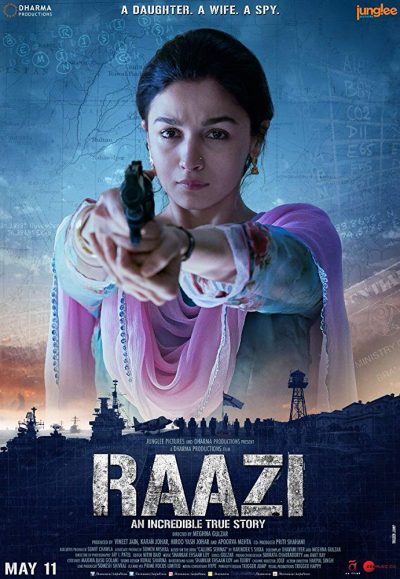
 This Indian spy thriller manages to be both remarkably restrained and human, avoiding a potentially jingoistic approach, and going for something considerably more measured. It takes place just before the war between India and Pakistan in 1971, when Indian agent Hidayat Khan is pretending to give information to Pakistan. In order to get close to their top brass, he convinces his daughter, Sehmat (Bhatt), to enter an arranged marriage to Iqbal Syed (Ahlawat), an officer whose father (Sharma) is a Brigadier in the Pakistani army. After being trained by senior intelligence officer Khalid Mir (Kaushal), she goes to join her new husband, and begins operations as a spy inside the Brigadier’s household.
This Indian spy thriller manages to be both remarkably restrained and human, avoiding a potentially jingoistic approach, and going for something considerably more measured. It takes place just before the war between India and Pakistan in 1971, when Indian agent Hidayat Khan is pretending to give information to Pakistan. In order to get close to their top brass, he convinces his daughter, Sehmat (Bhatt), to enter an arranged marriage to Iqbal Syed (Ahlawat), an officer whose father (Sharma) is a Brigadier in the Pakistani army. After being trained by senior intelligence officer Khalid Mir (Kaushal), she goes to join her new husband, and begins operations as a spy inside the Brigadier’s household.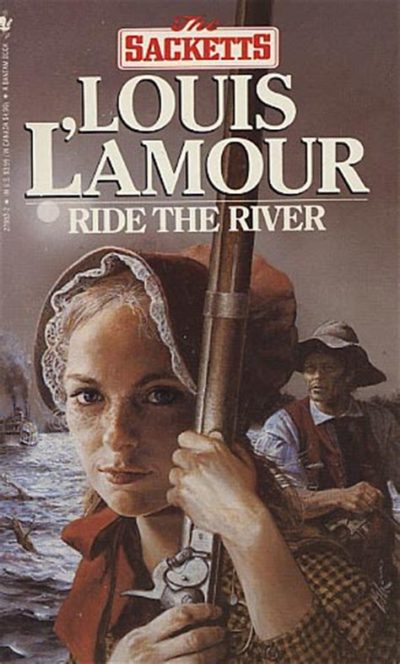 Goodreads characterizes this novel, set in 1840, as the fifth volume in the author’s Sackett series. The fictional Sackett family, in L’Amour’s writings, are descended from tough, larger-than-life Barnabas Sackett, who emigrated to America in the 1600s and settled on the frontier, and who laid down a law for his descendants that whenever a Sackett was in trouble, the rest were bound to lend their aid. This book is indeed about a Sackett, and no doubt chronologically the fifth in that sequence. But the sequence forms a multi-generational saga in which the individual books are generally about different people; though some knowledge of the family origins, as mentioned above, might be helpful (and is repeated in the text of this book, for readers who didn’t read the series opener), they can be read perfectly well as stand-alones. (I haven’t read any of the other Sackett novels.) L’Amour also wrote sequences of novels and stories about two other fictional families that bred adventurous pioneers, the Chantrys and the Talons, whose paths sometimes cross those of the Sacketts –and the paths of a couple of the Chantrys will bring them into this tale as well.
Goodreads characterizes this novel, set in 1840, as the fifth volume in the author’s Sackett series. The fictional Sackett family, in L’Amour’s writings, are descended from tough, larger-than-life Barnabas Sackett, who emigrated to America in the 1600s and settled on the frontier, and who laid down a law for his descendants that whenever a Sackett was in trouble, the rest were bound to lend their aid. This book is indeed about a Sackett, and no doubt chronologically the fifth in that sequence. But the sequence forms a multi-generational saga in which the individual books are generally about different people; though some knowledge of the family origins, as mentioned above, might be helpful (and is repeated in the text of this book, for readers who didn’t read the series opener), they can be read perfectly well as stand-alones. (I haven’t read any of the other Sackett novels.) L’Amour also wrote sequences of novels and stories about two other fictional families that bred adventurous pioneers, the Chantrys and the Talons, whose paths sometimes cross those of the Sacketts –and the paths of a couple of the Chantrys will bring them into this tale as well. There was a while there, where Russia dropped out of the top spot as far as being cinematic villains were concerned. No longer the “Evil Empire” of the Reagan era, they had largely been replaced, in the post 9/11 landscape, by Islamic fundamentalism. But now, those pesky Russkies are back as the bad guys once again, following their interference in the sacrosanct and solemn process of Americans electing a president. [I really must figure out a sarcasm font for this site] While this is supposedly set in the present day – I say that, because at one point, cutting-edge computer software is delivered on a set of floppy disks! – this feels more like something born out of Peak Cold War.
There was a while there, where Russia dropped out of the top spot as far as being cinematic villains were concerned. No longer the “Evil Empire” of the Reagan era, they had largely been replaced, in the post 9/11 landscape, by Islamic fundamentalism. But now, those pesky Russkies are back as the bad guys once again, following their interference in the sacrosanct and solemn process of Americans electing a president. [I really must figure out a sarcasm font for this site] While this is supposedly set in the present day – I say that, because at one point, cutting-edge computer software is delivered on a set of floppy disks! – this feels more like something born out of Peak Cold War. Not sure I’d go that far: I know it’s a great deal less
Not sure I’d go that far: I know it’s a great deal less  No, the main theme of the movie is the constantly shifting sands underfoot, which could easily open up at any moment and swallow the main protagonist. Some characters die during the course of the story, and it’s not necessarily the guilty ones who catch a bullet. But it’s a problem that there are hardly any sympathetic characters in the movie. Even Dominika is a big question mark, as the Russian secret service tactics force her to play a game of deception and manipulation, exactly as she was trained for. It leaves you, even at the end, guessing on which side she is/was/may have been on, in shades of Atomic Blonde. Things constantly change…
No, the main theme of the movie is the constantly shifting sands underfoot, which could easily open up at any moment and swallow the main protagonist. Some characters die during the course of the story, and it’s not necessarily the guilty ones who catch a bullet. But it’s a problem that there are hardly any sympathetic characters in the movie. Even Dominika is a big question mark, as the Russian secret service tactics force her to play a game of deception and manipulation, exactly as she was trained for. It leaves you, even at the end, guessing on which side she is/was/may have been on, in shades of Atomic Blonde. Things constantly change… I do give credit to Lawrence, who never saw an acting school from the inside, and has matured – yes, even by my standards! – into a “real actress”. I personally find it very positive that a studio is willing to make a movie almost entirely focused on its story with a nice budget ($69 million) instead of the next action-SFX-extravaganza. But I have seen better. That said, for those willing to invest the time and money, the movie may actually provide something. The actors are all good – I have not mentioned Mary Louise Parker in surprise cameo in the middle of the movie), the production design is impressive (even if Film-Russia seems to have a preference for 1970’s interior design) and the James Newton Howard (Salt, btw.) score is solid as always, even though it mainly plays in the background.
I do give credit to Lawrence, who never saw an acting school from the inside, and has matured – yes, even by my standards! – into a “real actress”. I personally find it very positive that a studio is willing to make a movie almost entirely focused on its story with a nice budget ($69 million) instead of the next action-SFX-extravaganza. But I have seen better. That said, for those willing to invest the time and money, the movie may actually provide something. The actors are all good – I have not mentioned Mary Louise Parker in surprise cameo in the middle of the movie), the production design is impressive (even if Film-Russia seems to have a preference for 1970’s interior design) and the James Newton Howard (Salt, btw.) score is solid as always, even though it mainly plays in the background.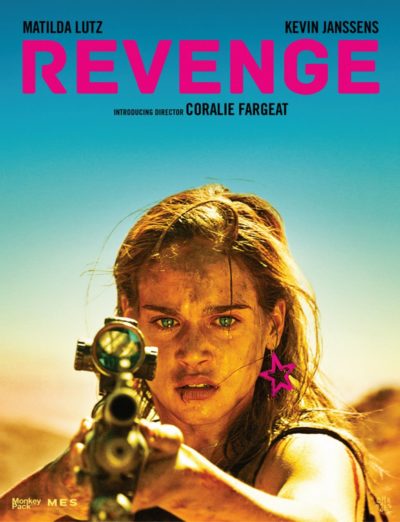
 For a film lauded for its supposed up-ending of the male gaze, this feels a bit odd, since it could be read as the sexual assault triggering Jen’s blossoming: rape as psychological therapy. She should thank her attackers! [The image of a rising phoenix branded into her skin, due to her impromptu first-aid, is not exactly subtle in its imagery. Then again, the entire film is not exactly subtle, and proudly defiant as such] If that reading is on shaky ground, it’s also amusing to note Revenge utterly fails the dreaded Bechdel Test, despite being brutally empowering, to a degree rarely seen. More evidence – as if it were really needed – of how shitty the Bechdel Test is at evaluating films.
For a film lauded for its supposed up-ending of the male gaze, this feels a bit odd, since it could be read as the sexual assault triggering Jen’s blossoming: rape as psychological therapy. She should thank her attackers! [The image of a rising phoenix branded into her skin, due to her impromptu first-aid, is not exactly subtle in its imagery. Then again, the entire film is not exactly subtle, and proudly defiant as such] If that reading is on shaky ground, it’s also amusing to note Revenge utterly fails the dreaded Bechdel Test, despite being brutally empowering, to a degree rarely seen. More evidence – as if it were really needed – of how shitty the Bechdel Test is at evaluating films.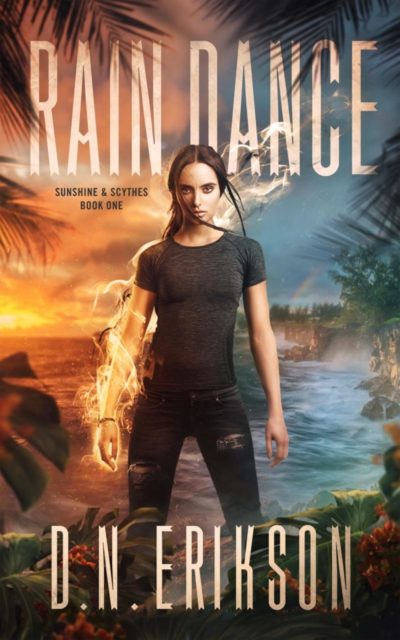 The saying, “You only live twice,” is supposed to be a metaphor, but for Eden Hunter, it ends up being very much a statement of fact. She’s a former con-artist, dragged back from beyond the grave by vampire warlord, Aldric. He puts her to work on a hidden island as his personal soul-harvester, with a strict quota per week. It’s not great work, but it’s steady – at least until Eden’s beach-front house is attacked by a werewolf with murder on its furry mind. She then finds herself seen by the FBI as their prime suspect after an old partner in confidence tricks turns up dead on her doorstep. But, wait! There’s more! She has to deal with the rain goddess – presumably, the source of the title – to whom Eden is also in thrall, and whose rules she just broke. A gang involved in robbing her boss of millions in gold bullion. Her dead sister. A serial-killer politician. Oh, and a talking cat.
The saying, “You only live twice,” is supposed to be a metaphor, but for Eden Hunter, it ends up being very much a statement of fact. She’s a former con-artist, dragged back from beyond the grave by vampire warlord, Aldric. He puts her to work on a hidden island as his personal soul-harvester, with a strict quota per week. It’s not great work, but it’s steady – at least until Eden’s beach-front house is attacked by a werewolf with murder on its furry mind. She then finds herself seen by the FBI as their prime suspect after an old partner in confidence tricks turns up dead on her doorstep. But, wait! There’s more! She has to deal with the rain goddess – presumably, the source of the title – to whom Eden is also in thrall, and whose rules she just broke. A gang involved in robbing her boss of millions in gold bullion. Her dead sister. A serial-killer politician. Oh, and a talking cat.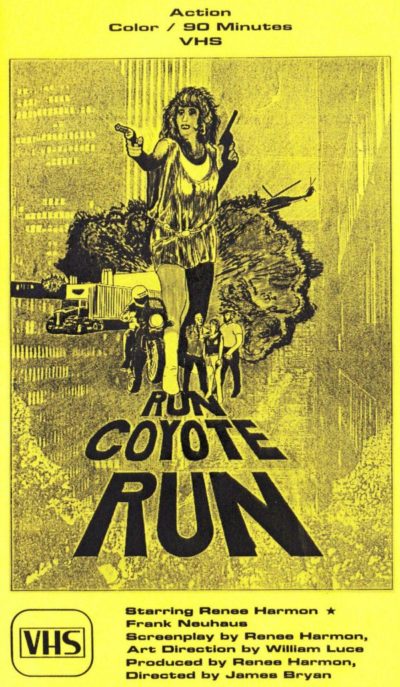 I must have masochistic tendencies. For having seen Bryan’s
I must have masochistic tendencies. For having seen Bryan’s 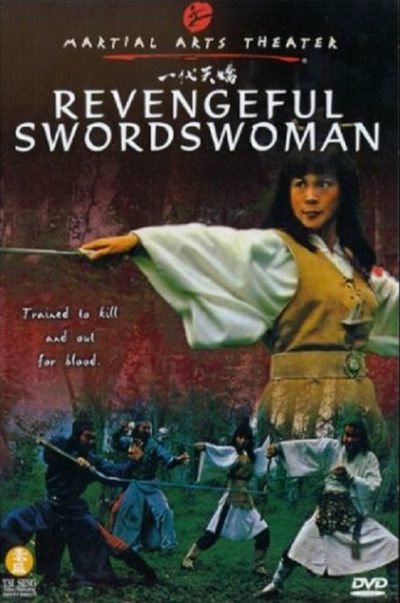 There’s no hanging around here. Virtually as we meet our heroine, Hsiang Ying (Lee), she’s getting tossed off a cliff by her kung-fu teacher, into a pack of wolves. Having survived that and made her way back – perhaps assuming this was all some terrible misunderstanding – her master then disavows her, announces he was the man responsible for killing her father, and locks her up in a cage. This all happens within, literally, three minutes of the film starting. Fortunately, a passing stranger sees fit to free her from the cage, and the ‘Heartless Lady’, as she becomes known, can go on her way, with the eventual aim of being exactly what the title suggests: revengeful.
There’s no hanging around here. Virtually as we meet our heroine, Hsiang Ying (Lee), she’s getting tossed off a cliff by her kung-fu teacher, into a pack of wolves. Having survived that and made her way back – perhaps assuming this was all some terrible misunderstanding – her master then disavows her, announces he was the man responsible for killing her father, and locks her up in a cage. This all happens within, literally, three minutes of the film starting. Fortunately, a passing stranger sees fit to free her from the cage, and the ‘Heartless Lady’, as she becomes known, can go on her way, with the eventual aim of being exactly what the title suggests: revengeful. Tied somewhat to our March feature on the earliest action heroines in cinema, is this Chinese film, It’s not just the oldest surviving action heroine film from that country, it’s the oldest martial-arts film of any kind. This silent feature dates from all the way back in 1929 – I had to keep reminding myself that the “red” in the title was not a Communism reference, this being from well before such things. It’s most likely an attempt to cash in on The Burning of the Red Lotus Temple, a now-lost film series whose highly successful release had begun the previous year.
Tied somewhat to our March feature on the earliest action heroines in cinema, is this Chinese film, It’s not just the oldest surviving action heroine film from that country, it’s the oldest martial-arts film of any kind. This silent feature dates from all the way back in 1929 – I had to keep reminding myself that the “red” in the title was not a Communism reference, this being from well before such things. It’s most likely an attempt to cash in on The Burning of the Red Lotus Temple, a now-lost film series whose highly successful release had begun the previous year.